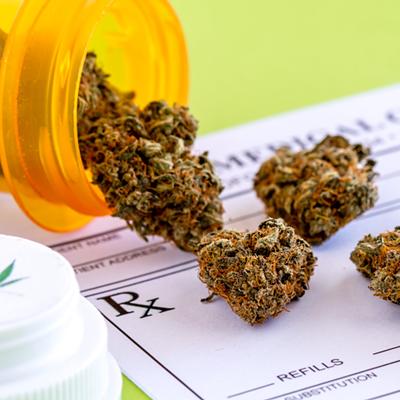Despite pot legalization of some form in a majority of states—36 have legal medical programs and adult-use recreational has reached 18, plus the District of Columbia—the federal government continues to hedge, with bills intended to legalize the cannabis economy lolling in the upper chambers of the U.S. government.
While marijuana remains a Schedule I narcotic on level with heroin and cocaine, states where the drug is legal are seeing huge increases in economic activity and tax revenue generation, despite legitimate marijuana businesses not having full access to banking services, funding sources or access to markets in other states. Obscure Reagan-era tax laws have also put the cannabis industry at a disadvantage, as your local dispensary cannot deduct many business expenses other industries take for granted.
The Arizona Department of Revenue collected $74,386,952 in total marijuana tax revenue between when adult-use recreational sales began at the end of January and the end of June, according to the Arizona Department of Revenue. That includes nearly $25 million from medical card holders and roughly $49.5 million from recreational sales.
The state is poised to collect more than $150 million in taxes from an industry that is on track to sell more than $1 billion worth of cannabis in 2021, with the new adult-use market doubling sales around the state.
That adds up to an average of $120 million in monthly sales of cannabis, both medicinal and recreational.
The pot of green is only projected to increase, as the market will likely top $2 billion annually after the recreational program reaches maturity in about three years.
Once Arizona's cannabis market gets to that point, the state is expected to rake in approximately $183,169,705 annually from sales taxes on legal pot sales, according to the Tax Foundation, a nonprofit organization that does fiscal analysis.
The green rush is not limited to the state of Arizona though, as legal cannabis sales across the nation increase with legalizations in what is now a majority of states.
According to a recent report by Leafly, in the first half of 2021 Americans "are on pace to spend twice as much on cannabis as they do on milk," hitting the $12 billion mark in the first six months of the year.
"That's nearly as much as Americans spent on milk in all of 2020," the report states. "According to the Dairy Farmers of America, consumers spent roughly $12.6 billion on milk last year."
In 2020, Americans spent $18 billion on legal weed and the industry is on pace to reach $25 billion to $26 billion in sales by the end of this year, an increase of roughly 35%.
Cannabis is the nation's fastest-growing industry, given that in 2020 sales revenue increased roughly 60% over 2019, largely driven by the coronavirus pandemic and the expansion of legalization across the country.
With all that money floating around, one would think the government would be right on board to ensure the taps opened up completely. Once voters put Democrat Joe Biden in the White House, there was renewed hope that the end of federal prohibition was finally nigh.
The struggle on the federal level continues, though, as lawmakers try to find a way to legalize cannabis and remove it from its Schedule I status that puts it on the level with much harder and more addictive drugs with "no currently accepted medical use and a high potential for abuse."
There are a handful of politicians who have continued to beat the drum for descheduling and expunging low-level pot convictions, including Senate Majority Leader Chuck Schumer (D), Senate Finance Committee Chairman Ron Wyden (D) and Sen. Cory Booker (D), who recently released a draft of the Cannabis Administration and Opportunity Act. The CAOA seeks to deschedule the plant, "normalizing income tax treatment, opening access to capital, and permitting interstate commerce in cannabis."
The bill includes an excise tax of 10% the first year that would grow to 25% by the fifth year on top of state taxes.
On the House side, there is the reemergence of a bill from Rep. Jerry Nadler (D-NY), the Marijuana Opportunity Reinvestment and Expungement Act (or MORE Act) that would also deschedule and tax on a federal level.
While CAOA and MORE would make strides to legalize and destigmatize cannabis, it would also add taxes that could make commercial costs prohibitive and drive cannabis users to unregulated, black markets, as the tax rate could reach 50% or more combined on the federal and state level for commercially available weed.
On another hand, existing cannabis businesses would benefit by no longer being subject to tax code Section 280E, enacted in 1982 to deny the deduction of business expenses to those selling drugs on Schedules I and II of the Controlled Substances Act.
The Reagan Administration enacted the rule with the intent to stop illicit drug dealers from deducting expenses like guns and yachts used in smuggling operations. But the IRS has applied the rule to state-authorized marijuana retailers, thus hurting business owners trying to comply with the law. The unintended consequences of that have created a competitive advantage for the black market operators Section 280E was enacted to penalize.
That has led to some legal pot businesses experiencing effective tax rates well above 70% by some reports.
But the will is there, even if there are several roadblocks along the way, the biggest being Republicans in the Senate.
In late July Sen. Booker tweeted: "Decriminalizing marijuana is not enough. We must also repair the damage done to those communities most harmed by a failed Drug War and expunge records. We should be demanding restorative justice." He also tweeted: "Veterans should have access to all treatment options—including medical marijuana—which is why for years I've been pushing legislation to allow this. It's long past time we legalize marijuana for our veterans & those who continue to suffer the consequences of our failed drug war."
Likewise, Sen. Schumer tweeted: "It's long past time to end the federal prohibition and undo the harms of the War on Drugs. That's why @SenBooker, @RonWyden, and I are working to pass our Cannabis Administration and Opportunity Act." He added: "The War on Drugs has been a war on people. @SenBooker, @RonWyden, and I released our Cannabis Administration and Opportunity Act to end the federal prohibition, enact criminal justice reforms, and invest in communities hurt by the War on Drugs."
On a final note, the restrictions on research may be falling by the wayside as an amendment to the proposed infrastructure bill seeks to allow researchers access to commercial quality weed rather than the "lawnmower clippings" from the University of Mississippi.
According to Marijuana Moment, the measure "makes it so the transportation secretary would need to work with the attorney general and secretary of health and human services to develop a public report within two years of the bill's enactment that includes recommendations on allowing scientists to access retail-level marijuana to study impaired driving."
It would also establish a "national clearinghouse" to "collect and distribute samples and strains of marijuana for scientific research that includes marijuana and products containing marijuana lawfully available to patients or consumers in a state on a retail basis."














